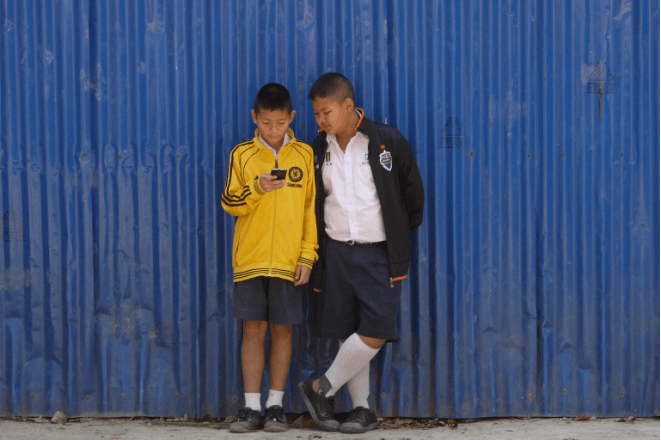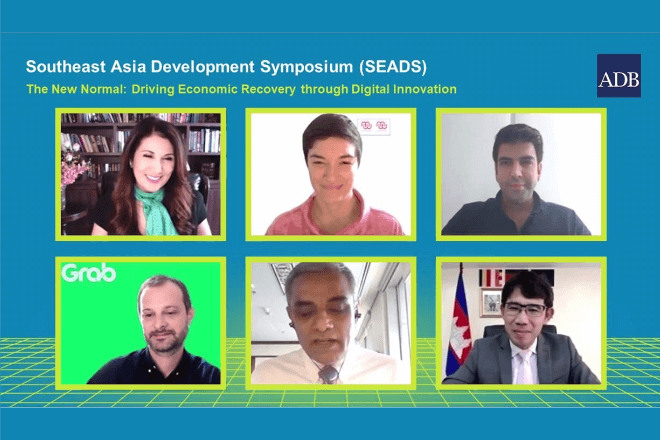
Technology has been a blessing for Southeast Asian countries dealing with the fallout from the coronavirus disease (COVID-19) pandemic, but for tech to fully deliver on its promise more needs to be done, including bridging the digital divide, according to speakers at the first Southeast Asia Development Symposium (SEADS) held on Wednesday.
In his opening keynote, Asian Development Bank (ADB) President Masatsugu Asakawa urged Southeast Asian countries to expand investments in digital infrastructure and ensure equitable access to technology as economies recover from the pandemic.
“We must close the digital divide and expand existing investments in digital infrastructure by building more and higher quality mobile broadband infrastructure and ensuring affordable internet access and coverage,” he said. “These steps can also enhance access to basic social services such as health and education and access to financial services. These investments will better equip countries to address the worsening income inequality and disparities in opportunities brought about by the pandemic.”
Tech as a critical enabling tool
In her keynote, Indonesia Finance Minister Sri Mulyani Indrawati cited how technology had helped many countries, including Indonesia, in coping with the challenges brought on by the pandemic. “The pandemic underscored the importance of technology, especially digital technology, as a critical enabling tool in this time of health crisis. The COVID-19 pandemic has accelerated the digitalization process and transformed the way we live, we learn, and earn a living. Technology has helped many of us survive in this challenging situation.”
She noted the crisis has pushed people, businesses, organizations, and governments to be creative in utilizing tech for remote working, online schooling, and e-commerce.
At the same time, she cited the challenges that lie ahead, noting in many Southeast Asian countries, including Indonesia, some places, particularly remote areas, still do not have access to the internet. This raises the risks of students and businesses, particularly micro and small enterprises, without internet access, being left behind.
“For policy makers, the challenge is to understand policy responses that are required to reap the benefits of new technologies while anticipating any associated risks. It is crucial that we have sound information based on robust research. This will enable us to understand the impact of new technologies and to devise and implement [appropriate] policies. Our policy making must be based on solid knowledge and forecast that help us identify opportunities and investments that can spur growth.”
Nadiem Anwar Makarim, Indonesia Minister of Education and Culture, a speaker at the panel discussion on “The New Normal: Driving Economic Recovery through Digital Innovation,” also noted the pandemic’s impact on education. He said governments are probably seeing huge savings by switching to digital meetings from face-to-face meetings, seminars, and conferences in the wake of COVID-19. “The sheer amount of efficiency from the monetary perspective is more than significant—20%-30% savings in national budgets.”
As a result, his ministry was able to reallocate the savings at a time when Indonesia is facing an educational crisis brought on the pandemic. “In the education space, in Indonesia or elsewhere, we’ve never seen the numbers of teacher and students experimenting with a huge variety of technological tools in order to find whatever meets the needs of their specific classroom or region. A lot of people are struggling. It takes years to adopt to a new kind of learning and most people had to adopt within a few months. Yes, there is definitely a negative quality of learning outcome in the short term.”
Renaissance in educational technological tools
Nadiem said remote learning is not an ideal scenario for students, noting many are struggling even those in university. But he takes heart that the education system has now gone online. “What’s going to happen I believe is a renaissance of educational technological tools to enhance teaching… The private sector and the government sector will now have an incredibly large petri dish to experiment on all kinds of technological interventions.”
He said his ministry is experimenting with an online financial system for school purchases, effectively giving schools their own e-commerce platform. The ministry is also experimenting with self-learning modules for teachers so online curriculum can be modularized to ensure teachers teach at the right level.
“A lot of unbundling can be done with technology and in the future we will be innovating face-to-face learning and hybrid models as opposed to just disrupting the concept of schools. I’ve come to terms with [the fact that it’s] very hard to disrupt the face-to-face need of children to interact with teachers and other children.”
Dr. Huot Pum, Undersecretary of State, Ministry of Economy and Finance, Cambodia, also shared his country’s experience with the pandemic during the session, “Call to Action Dialogue: ‘Creating an Inclusive Digital Agenda for the Future’,” noting COVID-19 has impacted the lives of his people on a daily basis. While digitalization has been on Cambodia’s policy agenda even before the pandemic, he said COVID-19 has made it more urgent for the government to speed up the implementation of policies to take advantage of the “momentum” now they are seeing in the digital economy.
He conceded that Cambodia lags behind other countries in the region in terms of connectivity, making it more urgent for his country to implement its digital agenda. “We want to seize the opportunity and reduce the [digital] gap.”
He said COVID-19 has also pushed the government and private sectors to collaborate more, noting in June, Cambodia launched a business registration portal to enhance the country’s competitiveness as an investment destination.
During “The New Normal: Driving Economic Recovery through Digital Innovation” panel discussion, Ahmed M. Saeed, ADB Vice-President, said during emergencies, digital innovation can help countries set up more robust systems to track down the most vulnerable so they can get aid and not go hungry. He noted the difference in the response time of countries with a national ID system as opposed to those without, as such a system enables authorities to reach the most vulnerable faster.
Ramesh Subramaniam, ADB Director General for the Southeast Asia Regional Department, meanwhile, said while digital solutions may be used to enhance revenue collection, governments are constrained by the fact that many small and medium enterprises in emerging Asia, more than 70%, operate informally. The added challenge facing countries in the region is how to bring unregistered businesses into the formal sector so they can be taxed.
The morning plenary also featured Microsoft General Manager for Asia-Pacific Public Sector Sherie Ng, 500 Startups Managing Partner Khailee Ng, Google Vice-President for Government Affairs and Public Policy Asia-Pacific Ted Osius, Mastercard Senior Vice President for Public-Private Partnership Mimi Alemayehou, Grab Group Managing Director-Operations Russell Cohen, MeshMinds Chief Connecting Officer Kay Vasey, and mClinica Founder and CEO Farouk Meralli. There were also afternoon sessions that dove deeper into how digital solutions could jump-start inclusive economic recovery, empower governments, improve access to education and healthcare, and spur e-commerce, fintech, and tourism.
Also on Wednesday, ADB launched the Southeast Asia Development Solutions knowledge platform, also SEADS. Both the forum and the website aim to provide government officials and other stakeholders with cutting-edge perspectives on critical development issues.
The one-day virtual event attracted more than 1,700 high-level government officials, private sector representatives, and other stakeholders from 57 countries.



